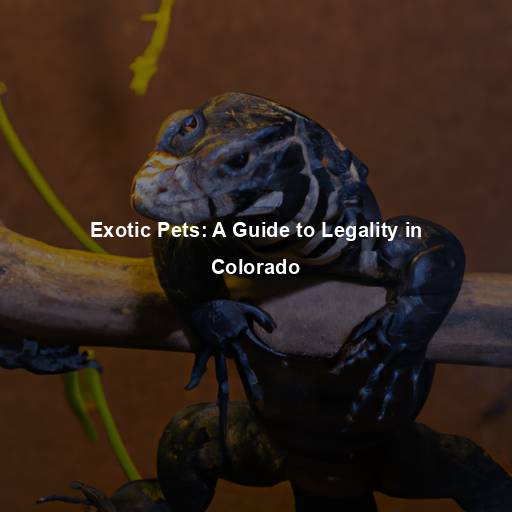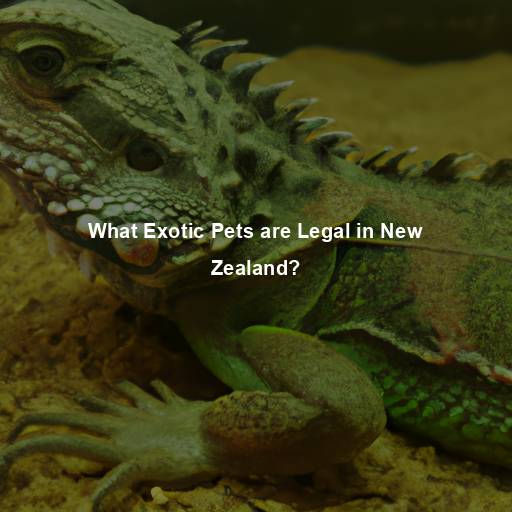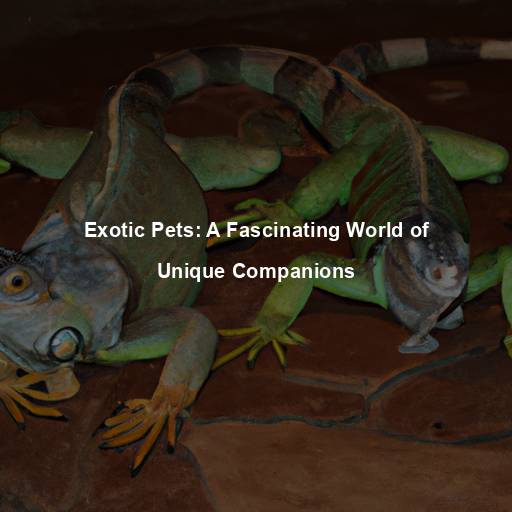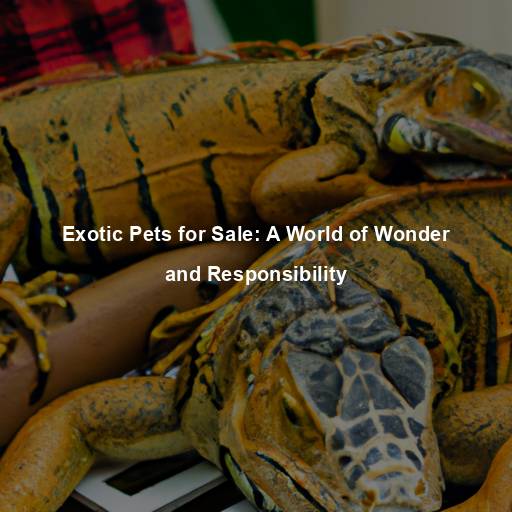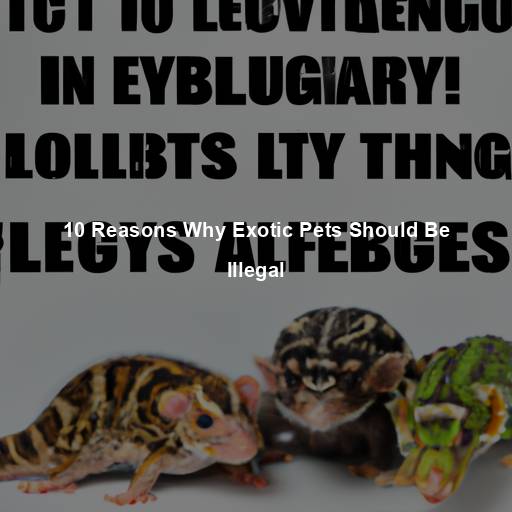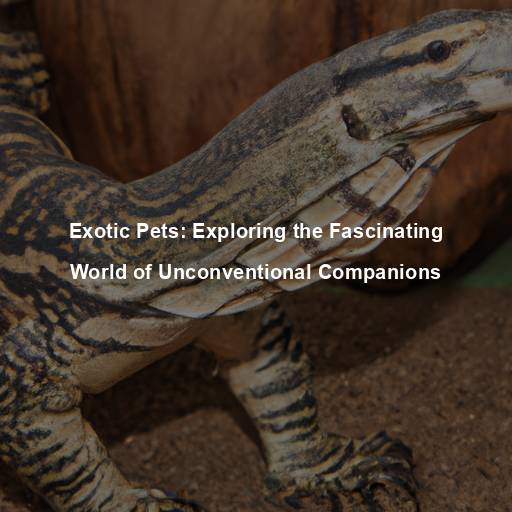What Exotic Pets are Legal in Florida without a License?
Last Updated on November 5, 2023 by Evan
Contents
- 1 Understanding the Legalities of Owning Exotic Pets in Florida
- 1.1 Unraveling the Legal Maze: Pets Allowed without a License
- 1.2 Licensing and Permit Requirements for Exotic Pets in Florida
- 1.3 Responsible Ownership and Ethical Considerations
- 1.4 Invasive Species and Ecological Disruption
- 1.5 The Burmese Python Epidemic
- 1.6 Responsible Pet Surrender and Adoption Programs
- 1.7 The Importance of Education and Awareness
- 2 Ensuring the Well-being of Exotic Pets
- 3 Alternatives to Exotic Pet Ownership
- 4 FAQs: What Exotic Pets are Legal in Florida Without a License
- 4.1 Are there any exotic pets that can be owned without a license in Florida?
- 4.2 What are some examples of exotic pets that can be owned in Florida without a license?
- 4.3 Are there restrictions on owning certain types of exotic pets without a license?
- 4.4 Do exotic pet owners have any responsibilities or regulations to consider?
- 4.5 Can I release my exotic pet into the wild if it becomes too difficult to care for?
Understanding the Legalities of Owning Exotic Pets in Florida
Florida, known for its diverse wildlife and tropical climate, has long been a popular destination for exotic pet enthusiasts. However, navigating the legal landscape of owning exotic pets can be quite challenging. While some animals are allowed to be kept as pets without a license, others require special permits or are outright prohibited. In this comprehensive guide, we will explore the fascinating world of exotic pets in Florida, shedding light on which species are legal to own without a license and what regulations pet owners need to be aware of.
Unraveling the Legal Maze: Pets Allowed without a License
Discover the extraordinary world of exotic pets that Florida law welcomes with open arms. Unleash the thrill and fulfillment of owning these captivating creatures without the shackles of licenses or permits. Brace yourself for the most sought-after and legal exotics in the Sunshine State. Indeed, prepare to embark on a journey of wonder and astonishment.
-
Bearded Dragons: Known for their unique appearance and docile nature, bearded dragons have become popular pets among reptile enthusiasts. These fascinating creatures are legal to own in Florida without a license.
-
Corn Snakes: With their vibrant colors and relatively easy care requirements, corn snakes have gained popularity as exotic pets. In Florida, owning a corn snake is legal without a license, making them a great choice for first-time reptile owners.
-
Hedgehogs: Hedgehogs, known for their prickly quills and adorable faces, have captured the hearts of many exotic pet lovers. Fortunately, these spiky companions can be owned legally in Florida without a license.
Discover the enchanting world of sugar gliders, the charming and enigmatic nocturnal marsupials capturing the hearts of animal lovers everywhere. These adorable pocket-sized companions have sparked an undeniable fervor, attracting a devoted following eager to experience the interactive joys of owning these captivating creatures. Uniquely, Florida offers the opportunity to embrace this pet ownership adventure without the hassle of obtaining a license, making sugar gliders an increasingly popular choice for those seeking a one-of-a-kind and exhilarating addition to their lives.
- Green Iguanas: While iguanas may require more specialized care and larger enclosures, they can be legally owned in Florida without a license. These herbivorous reptiles make fascinating pets for experienced reptile enthusiasts.
Licensing and Permit Requirements for Exotic Pets in Florida
While some exotic animals can be owned without a license in Florida, it’s important to note that many species require proper permits and documentation. The Florida Fish and Wildlife Conservation Commission (FWC) regulates the ownership of exotic animals to ensure their well-being and prevent the introduction of invasive species. Here are some important points to consider:
Class I Wildlife
Class I wildlife includes animals that are considered high-risk and potentially dangerous. Owning Class I wildlife in Florida requires a special permit from the FWC. Examples of Class I animals include:
Lions, the majestic creatures that ignite both awe and trepidation in the hearts of many, have long captivated our imaginations with their regal presence and untamed spirit. With their glistening coats and piercing gaze, these enigmatic felines embody a paradoxical blend of power and vulnerability, leaving us in perpetual wonder of their existence. As we delve into their world, exploring their complex social dynamics and awe-inspiring hunting techniques, we find ourselves in a state of bewildered fascination, constantly yearning for more insights into these captivating beasts.
– Tigers
– Bears
– Monkeys
– Crocodiles
It’s important to note that obtaining a permit for Class I wildlife is a complex process, involving thorough background checks, facility inspections, and meeting stringent requirements to ensure public safety and animal welfare.
Class II Wildlife
When it comes to navigating the wild kingdom, there exists a category known as Class II wildlife, which offers a glimpse into the fascinating realm of creatures that possess a certain air of mystique. Though not as formidable as the illustrious Class I species, these remarkable beings carry within them a potential for enigmatic behavior and unexpected surprises. In the Sunshine State of Florida, the acquisition of these intriguing animals necessitates a permit from the esteemed FWC, allowing enthusiasts to embark on an extraordinary journey of coexistence. From captivating creatures like the owl to other enigmatic entities, it is within the realm of Class II wildlife where perplexity and exhilaration intricately intertwine.
- Bobcats
- Cougars
Cheetahs, the epitome of explosive speed and grace, captivate our imagination with their boundless energy and enigmatic presence. These magnificent felines, with their sleek, aerodynamic bodies and mesmerizing spots, embody the essence of the wild, where every moment teems with uncertainty and unpredictability. In a world where survival is a constant struggle, cheetahs embrace their fleeting moments, harnessing bursts of energy to chase down their elusive prey, leaving us in a state of perpetual awe and wonder. - Rhinoceroses
From their impossibly elongated necks to their elegantly patterned coats, giraffes are truly mesmerizing creatures that captivate both young and old alike. Found roaming the vast savannas of Africa, these gentle giants defy gravity as they gracefully maneuver their towering frames through the treetops. But despite their majestic appearance, giraffes remain a subject of great mystery, leaving scientists and animal enthusiasts perplexed by their unique anatomy and intriguing behavior. Join us as we delve into the enigmatic world of giraffes and unveil the secrets that make them one of nature’s most awe-inspiring wonders.
As with Class I wildlife, the FWC carefully evaluates the suitability and capability of the owner to care for these animals before issuing a permit.
Class III Wildlife
In the fascinating realm of wildlife classification, we encounter Class III creatures – delightful beings who enchant us with their gentle nature and present no significant harm to the public. Florida, an oasis of wild wonders, permits the ownership of these captivating animals without the pesky need for licenses or permits. Allow me to present a few mesmerizing examples from this enchanting category:
Have you ever heard of the mesmerizing creatures known as Fennec Foxes? These enigmatic desert dwellers are renowned for their unique characteristics. With their strikingly large ears, these pint-sized canines possess an uncanny ability to adapt to their arid habitats, leaving scientists and nature enthusiasts alike in awe. Their cunning agility and elusive nature have made them a subject of fascination, leaving us yearning to uncover more about these whimsical creatures.
– Kinkajous
Discover the untamed wonders of the wallabies as they journey through the wilderness with their agility and grace. Unveil the enigmatic world of these marsupials, as their mysterious allure leaves us captivated and yearning for more. Immerse yourself in their eccentric behaviors, striking patterns, and radiant personalities, and let their captivating presence ignite your curiosity and appreciation for the diversity of our planet’s wildlife. Join us on an unforgettable exploration and unlock the secrets of these fascinating creatures that continue to mesmerize and perplex us.
– Chinchillas
– Capuchin Monkeys (weighing less than 35 pounds)
Owning these creatures may not necessitate permits, yet responsible owners must prioritize their health, ensure adequate nourishment, and provide appropriate habitats for their thriving.
Responsible Ownership and Ethical Considerations
While owning an exotic pet can bring joy and fulfillment, it also comes with significant responsibilities. Before considering bringing an exotic animal into your home, it is crucial to thoroughly research the species’ specific needs, care requirements, and potential challenges. Here are some key factors to consider:
Research and Education
Owning an exotic pet comes with its fair share of responsibilities, and delving into the depths of their natural habitat, behavior, and specific care requirements is absolutely paramount. By immersing yourself in extensive research from trustworthy sources, engaging in conversations with seasoned exotic pet enthusiasts, and seeking expert advice from veterinarians well-versed in these unique creatures, you guarantee the utmost care and welfare for your unconventional companion.
Adequate Enclosure and Enrichment
Creating a haven that reflects the exotic creatures’ natural surroundings is an absolute necessity, bestowing upon them a habitat that truly feels like home. A generous space is vital, ensuring ample room for them to roam freely, while fortified enclosures safeguard their security. It is imperative to replicate the native climate using specialized heating and lighting systems, while also incorporating stimulating elements that engage their minds and bodies, appeasing their ever-curious nature.
Regular Veterinary Care
When it comes to the health and happiness of your exotic pet, finding a veterinarian who specializes in exotic animal medicine is an absolute must. These unique and out-of-the-ordinary pets come with their own set of medical needs, and it’s crucial to have a professional who understands and can address them. Regular check-ups are the key to ensuring their well-being, as they allow for the early detection and prevention of any potential health concerns that may arise. So, don’t be perplexed – make finding the perfect exotic animal vet a top priority!
Ethical Considerations
It’s essential to consider the ethical implications of owning an exotic pet. Many exotic species are subjected to illegal wildlife trafficking, which contributes to their decline in the wild. As responsible pet owners, it’s crucial to ensure that the exotic pet you choose is ethically sourced and not contributing to the destruction of natural habitats or the exploitation of wildlife.
Invasive Species and Ecological Disruption
The moment exotic pets venture out into the untamed wilderness or slip through the cracks of domestication, chaos ensues. Braving the unknown, these unconventional creatures transform into invasive species, posing an enigmatic threat to the native flora and fauna they encounter. Adorned with an arsenal of survival skills and unmatched tenacity, they wage war on the delicate equilibrium of ecosystems, fiercely competing for vital resources. Uniquely vulnerable in its rich tapestry of biodiversity, it is the Sunshine State of Florida that bears the perplexing brunt of these invasive invaders’ havoc.
The Burmese Python Epidemic
The extraordinary ecological consequences caused by exotic pets in Florida have become alarmingly apparent, with the Burmese python phenomenon in the Everglades at the forefront. These colossal constrictor snakes, initially brought in through the pet trade, have remarkably flourished in the subtropical surroundings, wreaking havoc on the native wildlife by obliterating their populations. The uphill battle to manage these proliferating pythons has proven to be an onerous task, underscoring the pressing necessity for a more accountable approach to owning exotic pets.
Responsible Pet Surrender and Adoption Programs
In our ever-evolving ecosystem, where the delicate balance of nature hangs in a delicate thread, a perplexing conundrum arises when it comes to exotic pets. To unravel this enigma and minimize its bewildering consequences, it becomes paramount to advocate for responsible pet surrender and adoption initiatives. Rather than the chaotic and potentially catastrophic act of releasing these majestic creatures into the untamed wilderness, we encourage pet owners to embark upon the path of enlightened choices by seeking out reputable organizations that can offer them a safe and nurturing haven, or facilitate their adoption into the capable hands of experienced individuals or institutions.
The Importance of Education and Awareness
In a world filled with captivating creatures, it’s crucial that we unravel the complexities surrounding the ownership of exotic pets. By shedding light on the ecological repercussions, we can empower individuals to make conscientious decisions. Equipping potential owners with knowledge about the far-reaching implications of releasing these unique animals into the wild and encouraging them to adopt from reputable sources, we can pave the way for a more harmonious coexistence with our fragile ecosystems.
Ensuring the Well-being of Exotic Pets
When choosing to bring an extraordinary creature into your life, it is not merely a matter of pride but also a profound obligation. These exotic beings possess an enigmatic allure, yet their physical, behavioral, and dietary needs are unlike anything we encounter in the realm of conventional pets. One must embark on a journey of understanding, carefully treading the path of uncommon knowledge, to guarantee the utmost care and contentment for these enigmatic souls. Allow me to unveil a glimpse of the vital elements one must ponder before embracing the enigmatic world of exotic pets.
Specialized Veterinary Care
Finding a veterinarian who specializes in exotic animal medicine is crucial for the well-being of your pet. Exotic animals often have specific health concerns and may require specialized treatments or medications. Regular veterinary check-ups are essential to detect and address any potential health issues early on.
Proper Nutrition and Enrichment
Exotic pets often have specific dietary needs that must be met to maintain optimal health. It’s important to research and provide a balanced and species-appropriate diet for your pet. Additionally, enrichment activities such as puzzle toys, climbing structures, and interactive playtime are essential to keep exotic animals mentally stimulated and prevent boredom.
Suitable Enclosures and Environmental Enrichment
Creating a suitable living environment for your exotic pet is crucial to their well-being. Enclosures should be spacious, secure, and provide opportunities for natural behaviors such as climbing, digging, or burrowing. Providing hiding spots, perches, and environmental enrichment items like branches, tunnels, and toys can help mimic the animal’s natural habitat and promote their overall health and happiness.
Socialization and Mental Stimulation
Many exotic animals are social creatures and require socialization and mental stimulation to thrive. Understanding the specific social needs of your pet species and providing opportunities for interaction, whether with humans or conspecifics, is essential for their well-being.
Wildlife Trafficking and Conservation Concerns
The allure of owning rare and extraordinary creatures fuels the thriving industry of exotic pet trading. Yet, hidden behind the tantalizing allure lies a dark underbelly of illegal practices like poaching and smuggling. These illicit activities not only jeopardize the lives of individual animals but also pose a grave threat to the very existence of entire species and their delicate ecosystems. In our pursuit of owning these remarkable beings, we unwittingly partake in the exploitation and devastation of wildlife populations across the globe.
Preservation of Natural Habitats
The capture and transportation of exotic animals often involve destructive practices that harm ecosystems. Removing animals from their natural habitats disrupts ecological balance and can have long-lasting consequences. Preserving these habitats is crucial for the survival of countless species, as they provide essential resources and support biodiversity. By refraining from owning exotic pets and supporting conservation efforts, we can help protect fragile ecosystems and the animals that call them home.
Animal Welfare and Captive Breeding
Keeping exotic animals in captivity presents a perplexing maze of challenges, both physical and behavioral, that seemingly defy solutions. These extraordinary creatures demand a level of care that far surpasses the ordinary, necessitating extensive space, specialized attention, and social interaction that can leave even the most well-meaning pet owner feeling bewildered. While the noble intention of captive breeding programs is to alleviate the strain on wild populations, a dark underbelly emerges, where profit-driven motives often overshadow the well-being of these majestic beings. In light of these disconcerting realities, it becomes imperative for society to engage in a thought-provoking discussion, probing the very ethos of breeding and selling exotic pets for personal amusement.
Alternatives to Exotic Pet Ownership
With the myriad of legal, ecological, and ethical considerations surrounding the ownership of exotic pets, it is crucial to examine alternative avenues through which we can still admire and engage with captivating creatures. Thankfully, there are numerous options available that offer a satisfying substitute to conventional exotic pet ownership. Whether it be visiting well-maintained sanctuaries, volunteering at animal rescue centers, or even immersing oneself in wildlife documentaries, there are countless ways to satisfy our curiosity and appreciation for the animal kingdom without compromising their well-being or the delicate balance of their natural habitats. So, let’s embark on a journey of discovery and compassion, as we seek out unconventional means to connect with the awe-inspiring world of wildlife.
Visiting Accredited Zoos and Sanctuaries
Accredited zoos and sanctuaries provide opportunities to observe and learn about exotic animals in a controlled and educational environment. These establishments prioritize animal welfare, conservation, and public education, allowing visitors to develop a deeper understanding and appreciation for wildlife.
Volunteering and Supporting Conservation Organizations
Getting involved with local conservation organizations and volunteering your time and skills can make a significant impact on wildlife conservation efforts. By supporting initiatives that protect natural habitats, rescue and rehabilitate animals, and advocate for sustainable practices, you contribute to the preservation of biodiversity and the well-being of exotic species.
Wildlife Photography and Nature Documentaries
There’s something truly captivating about taking a photographic journey into the wild or delving into the mesmerizing world of nature documentaries. It’s a chance to not only behold the breathtaking beauty of wildlife but also gain a profound understanding of their intricate existence. By indulging in these artistic and educational sources, we can immerse ourselves in the wonders of the natural realm without infringing upon the freedom and dignity of these extraordinary creatures.
Advocacy and Education
As we embark on our journey to foster responsible pet ownership and illuminate the ethical dilemmas entwined within the exotic pet trade, one can’t help but feel both a sense of urgency and an overwhelming responsibility. By harnessing the power of knowledge, shining a light on the intricate tapestry that is the environmental impact, animal well-being, and conservation endeavors, we can pave the way towards a more harmonious and conscientious relationship with these captivating creatures from afar. Let us join hands and embrace a shared vision, igniting change and sowing the seeds of compassion towards our beloved exotic companions.
FAQs: What Exotic Pets are Legal in Florida Without a License
Are there any exotic pets that can be owned without a license in Florida?
When it comes to owning exotic pets in Florida, the situation can be quite perplexing. While some species may not require a license, the rules and regulations governing the ownership of these unique creatures can be a veritable labyrinth. To avoid getting caught in a legal jungle, it is paramount for prospective owners to conduct meticulous research and familiarize themselves with the specific regulations applicable to their county or municipality. Ignorance of these peculiar and often capricious laws could lead to dire consequences for both the would-be owner and the exotic pet in question.
What are some examples of exotic pets that can be owned in Florida without a license?
If you’re an adventurous soul looking to venture into the world of exotic pets, Florida might just be the place for you! In this perplexing state, you can own some captivating creatures without the hassle of obtaining a license. From the slithering beauty of corn snakes and ball pythons to the enchanting charm of geckos and anoles, the options are simply bursting with variety. And let’s not forget the delight of owning a hedgehog, a sugar glider, or even a colorful avian companion. Florida’s list of non-license-required exotic pets will surely leave you in awe and wonder!
Are there restrictions on owning certain types of exotic pets without a license?
While Florida allows certain exotic pets to be owned without a license, there are still restrictions in place. It is important to understand that some species may appear legal to own, but they may be restricted at the local level. For example, some counties or municipalities may have specific rules regarding the ownership of primates, large cats, or certain types of reptiles. It is crucial to check with your local animal control or wildlife authorities to ensure compliance with all applicable regulations.
Do exotic pet owners have any responsibilities or regulations to consider?
Owning an exotic pet in Florida comes with its fair share of surprises and responsibilities. Whether you’re required to have a license or not, one thing remains certain – you need to be prepared. From providing top-notch care and nutrition to ensuring the right kind of habitat for your unique companion, it’s all about their well-being. But the unexpected twist comes when you realize that zoonotic diseases could be lurking around the corner, posing a potential risk to both you and your furry friend. Be sure to stay ahead of the game by regularly visiting the vet, implementing proper containment measures, and adopting responsible handling practices. After all, being a responsible exotic pet owner is all about staying one step ahead of the game.
Can I release my exotic pet into the wild if it becomes too difficult to care for?
It’s a well-known fact that setting free exotic pets into unfamiliar habitats is a big no-no, strongly frowned upon and even deemed against the law. Not only is it a risky move that can wreak havoc on the delicate balance of ecosystems, but it also poses a grave threat to the indigenous species already inhabiting the area. Should you find yourself in a bind and unable to provide for your unique pet, it’s imperative to explore responsible options like teaming up with reliable animal sanctuaries, rescue groups, or locating a capable caregiver who can provide the necessary expertise.


